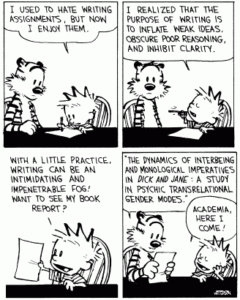Epistemological Approach

http://www.prnewsonline.com/pr-writing-test
Like many students across the country, when I was admitted to college, I was very excited about the prospect of learning higher level skills I’d use for the future. I was also admitted into the Honor’s program,  which only increased my excitement. Upon entering my Honors Freshman English class, I sat down ready to write advanced essays, waiting to be challenged. However, much to my dismay, the first paper was a narrative: write about your most embarrassing moment and what you learned from it. From there, we were tasked with writing a persuasive essay and other short writings where grammar superseded content. I completely checked out. How was this college-level writing?
which only increased my excitement. Upon entering my Honors Freshman English class, I sat down ready to write advanced essays, waiting to be challenged. However, much to my dismay, the first paper was a narrative: write about your most embarrassing moment and what you learned from it. From there, we were tasked with writing a persuasive essay and other short writings where grammar superseded content. I completely checked out. How was this college-level writing?
As an English Instructor and a burgeoning composition scholar, I find myself questioning the basic premise of the first-year writing courses I have taught over the years. Though I understand the purpose behind this requirement (college-level writing is not easy for most students), I continue to grapple with the execution of its purpose. Unlike Crowley, I do believe that first-year/introductory writing courses (FYCs) should be required for all students, especially at institutions with open enrollment policies. In fact, a strong foundation in the writing expectations at the college level can be very beneficial for all students, no matter the institution.
However, even with stating this, the idea that one or two introductory writing courses can teach students every genre in every discipline is unrealistic, as agreed by Wardle, Downs, and Fraizer. There is already the understanding that one introductory course in a discipline is not enough to teach students everything there is to know about that discipline, so why so much pressure on FYCs? As Fraizer states, “The argument that general writing skills instruction teaches students a “universal educated discourse” is discredited as myth” (36). In other words, the fundamental goal of FYCs can not be achieved.
Since I’m a proponent for the FYC requirement, like Wardle, I feel that writing should be treated as the disciplinary focus of these courses, i.e. writing about writing (WAW). The composition field has really grown into its own, moving beyond the basic writing courses of its inception, complete with its own scholarship, scholars, and theoretical frameworks. With this in mind, students should be equipped, not with attempts at mimicking other disciplines’ genres (what Wardle calls “mutt genres”), but with knowledge of writing itself. Quoting Freedman, Wardle asserts, “FYC courses are different in “substance . . . epistemological assumptions . . .and ideological context” from all the other courses for which they purport to prepare students to write” (766). Because the teaching of genres is incredibly context-specific, mimicking these contexts fails to understand the foundations and underlying assumptions upon which these contexts are built, including the content knowledge the students and instructors would need in order to effectively write in specific disciplines.
Aside from refocusing FYCs towards WAW, simply shifting from the general writing skills framework to WAW will not help make FYCs more effective for students or instructors alike. One of the central problems I’ve faced as an instructor is not having the theoretical framework behind the courses I taught, which can be remedied by adding the theoretical concept of threshold concepts to my teaching. As Meyer and Land state, threshold concepts are “‘conceptual gateways’ or ‘portals’ that lead to a previously inaccessible, and initially perhaps ‘troublesome,’ way of thinking about something” (373). Since composition has a plethora of scholarship, why not share some of this information with our students? By combining threshold concepts with WAW (as Wardle and Downs have done), composition instructors can move beyond just practicing our craft to also utilizing and understanding a theory for our craft.
It is important for us composition instructors and professors–including contingent faculty and graduate students–to increase our disciplinary presence via professionalization. We are content-area specialists and our field will benefit greatly by constant articulation and rearticulation of our disciplinary threshold; professional development and building communities where instructors can exchange ideas are key. According to Phelps, “The business of such a community is curriculum development as a form of knowledge-making” (867). This “knowledge-making” can help department members understand the bigger picture of FYCs within the college/university community.
In all, I hope to contribute to the shift in FYC instruction and practice within my own institution, which, like many writing programs across the country, still utilizes “mutt genres” and a literature focus with the hope of skill transference. Because this shift cannot happen overnight, I hope to lead professional development efforts and increase my program’s effectiveness so my students, like many others, can benefit from the composition scholarship. In essence, I wish to create the type of writing program I never had.
Works Cited
Fraizer, Dan. “First Steps Beyond First Year: Coaching Transfer After FYC.” WPA: Writing Program Administration, Vol. 33, No. 3, Spring 2010, 24-57. Council of Writing Program Administrators. PDF. 27 September 2016.
Meyer, Jan H.F. and Ray Land. “Threshold concepts and troublesome knowledge (2): Epistemological considerations and a conceptual framework for teaching and learning.” Higher Education 49, (2005), pp. 373–388.
Phelps, Louis Wetherbee. “Practical Wisdom and the Geography of Knowledge in Composition.” College English, Vol. 53, No.8 (Dec., 1991), pp. 863-885. PDF.
Wardle, Elizabeth. “Mutt Genres” and the Goal of FYC: Can We Help Students Write the Genres of the University?” CCC, Vol. 60, No. 4 (June 2009), pp. 765-789.
